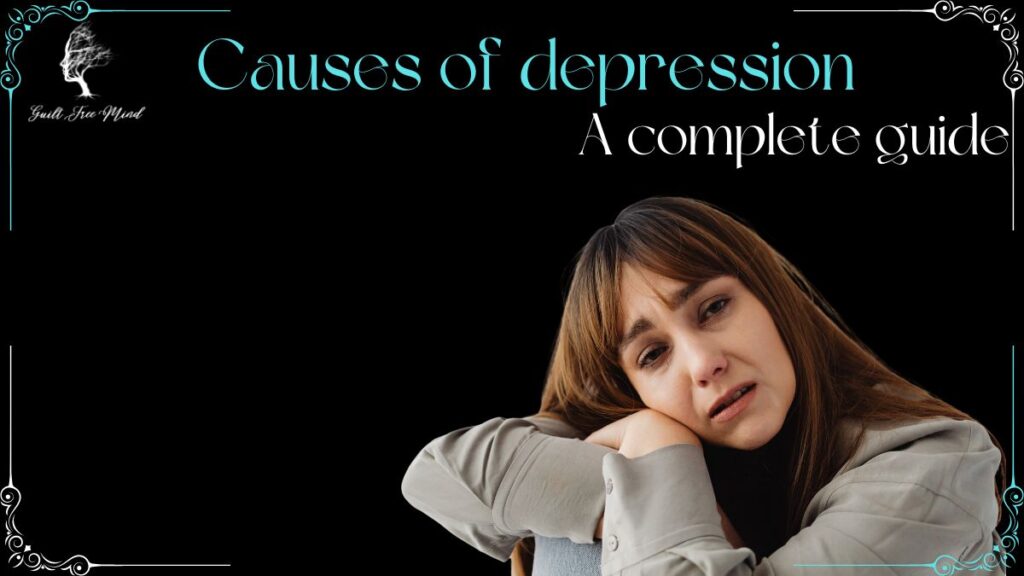Have you ever wondered what makes someone clinically depressed? You may have gone to a mental health professional and were told that you are suffering from major depressive disorder, which might have made you wonder why some people get extended episodes of sadness and others don’t. In this article, I will discuss the causes of depression, why it occurs, and the factors that contribute to clinical depression.
If you wish to know more about how to lead a more positive and fulfilling life and deal with life’s daily stress, subscribe to Guilt Free Mind. The subscription option is present in the sidebar. If you like watching videos, subscribe to the YouTube channel of Guilt Free Mind. Remember to ring the notification bell and set it to all.
Table of Contents
Causes of depression
People often say that the causes of depression are chemical imbalances in the brain, but that doesn’t show how complicated the disease is. Research shows that having too much or too little of certain chemicals in the brain does not cause the symptoms of depression. Instead, there are many other factors that can be the causes of depression, such as the inability to control their moods well, the presence of specific genes that make people more likely to get depressed, and stressful events in life. People think that several of these things work together and are the founding factors of depression.
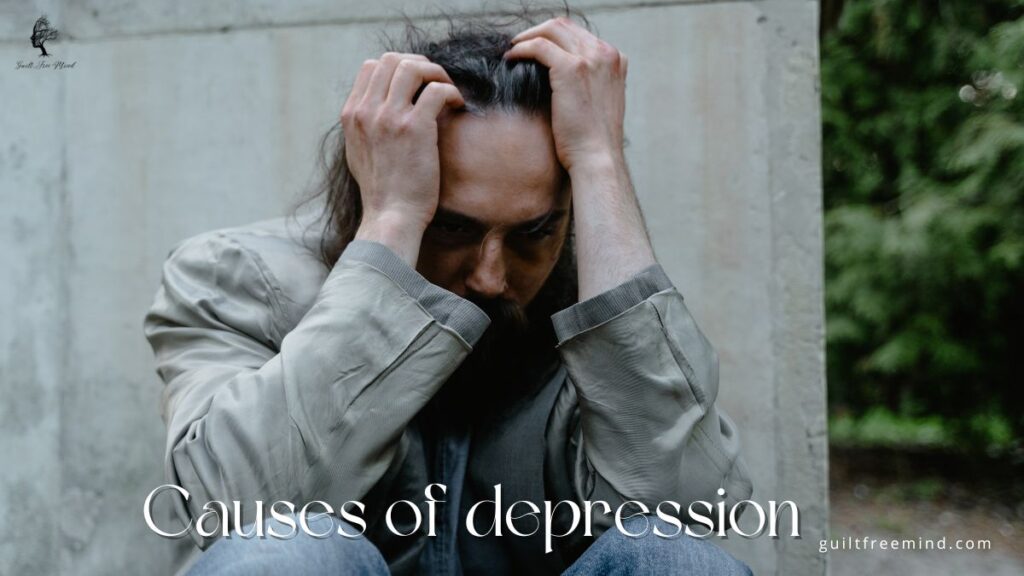
Certain chemicals are also a part of this process. However, it is not as easy as one chemical being too low and another being too high. Instead, many chemicals inside and outside of the neural network are at work. There are billions of chemical processes that make up the neural network that controls your mood, how you see the world, and how you feel about life. With this level of complexity, it’s easy to understand how two people with depression could have similar symptoms, but the problem on the inside could be very different. Thus, the treatment mechanisms may require customization to fit the needs of the specific individual.
Understanding depression
Depression is a mood disorder that makes you feel sad and lose interest in all the things you love. It can also be called clinical depression or major depressive disorder. It changes how you feel, think, and act, and it can lead to a number of emotional and physical problems. You might have trouble doing normal day-to-day things, and you might feel like life isn’t worth living sometimes.
A common myth associated with depression is that it is a phase and a person will snap out of it on their own. Depression is more than just a case of the blues, and you can’t just “snap out” of it. Depression may need to be treated for a long time. But don’t get frustrated. Most people who are depressed feel better when they take medicine, go to therapy, or do both.
Understanding the types of depression.
The Diagnostic and Statistical Manual of Mental Disorders, Fifth Edition (DSM-5) of the American Psychiatric Association lists the following as types of depression disorders:
A person is diagnosed with clinical depression or major depressive disorder, which is when you feel sad, low, or useless most of the time. To be diagnosed with clinical depression, you must show the symptoms for at least two weeks. You may also have trouble sleeping, lose interest in activities, or change your appetite. This is one of the most common and most serious types of depression.
Persistent depressive disorder
Persistent depressive disorder, or PDD, is a mild or moderate form of depression that lasts for at least two years. The signs are not as bad as those of major depression. PDD used to be called dysthymia by people in the medical field.
Disruptive mood dysregulation disorder (DMDD):
Descriptive mood deregulation disorder is diagnosed in kids. Children with DMDD have a lot of anger and are always very irritable. Usually, the first signs show up by age 10.
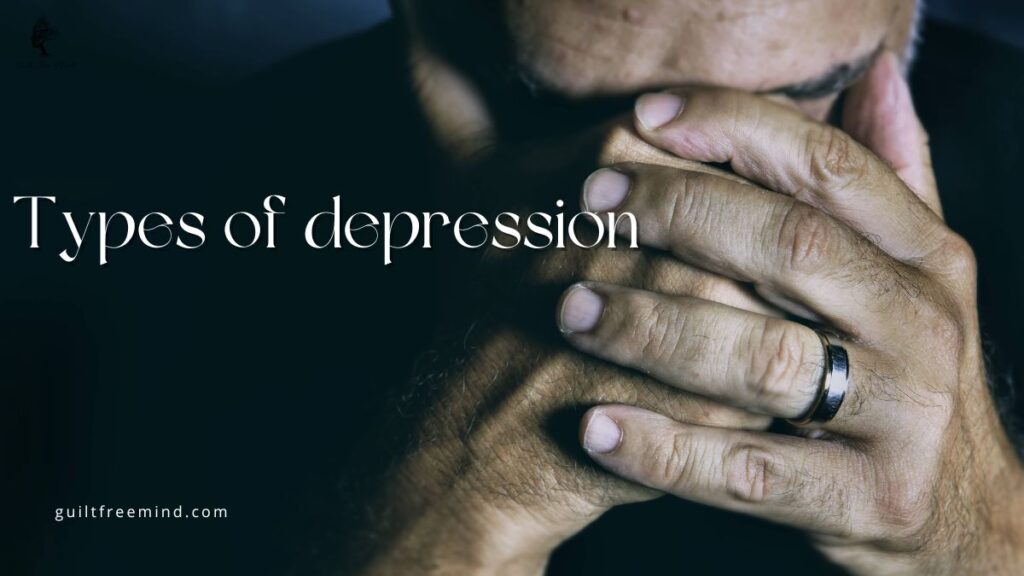
Premenstrual dystrophic disorder (PMDD)
Premenstrual dysphoric disorder (PMDD) is when you have signs of premenstrual syndrome (PMS) as well as mood symptoms like being very angry, anxious, or sad. After your period starts, these symptoms go away after a few days, but they can be bad enough to get in the way of your life.
Depressive disorder caused by another health problem:
Constantly facing health issues can also cause a person to go into depression. Many health problems can cause changes in your body that can become the causes of depression. Hypothyroidism, heart disease, Parkinson’s disease, and cancer are some examples. If you can treat the cause of the depression, the depression generally gets better as well.
Other forms of depressive disorders
Seasonal affective disorder
Seasonal affective disorder, also called “seasonal depression,” is a type of major depressive disorder that usually starts in the fall and winter and goes away in the spring and summer.
Prenatal/postpartum depression
Depression during pregnancy is called prenatal depression. Depression after giving birth is called postpartum depression. Postpartum depression is a type of sadness that happens in the first four weeks after a baby is born. The DSM calls these “major depressive disorder (MDD) with peripartum onset.”
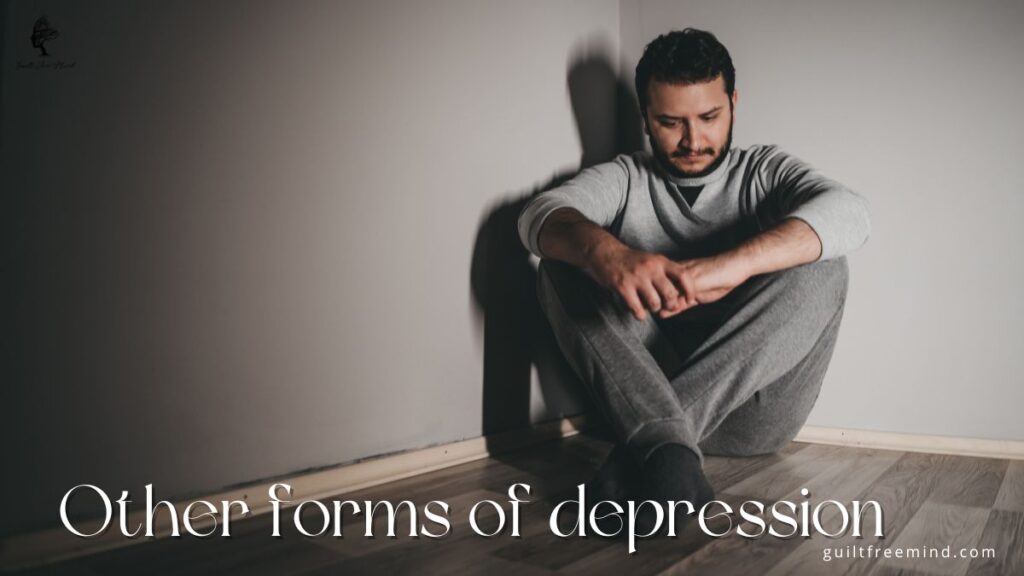
Atypical depression
Atypical depression has symptoms that are a little different from “typical” depression. The other name for atypical depression is major depressive disorder with atypical features. The biggest difference is mood reactivity, which is a temporary improvement in mood when good things happen. Other important signs are an increased hunger and a heightened sensitivity to rejection.
In addition to manic or hypomanic episodes, people with bipolar illness also have times when they feel sad.
Symptoms
Depression can happen only once in a person’s life, but most people have more than one episode. During these episodes, the symptoms of depression happen most of the day, almost every day. The most commonly faced symptoms include:
- Sadness, tears, nothingness, or a constant lack of hope for the future.
- Constant anger, irritability, or frustration even at the smallest of problems
- Loss of interest or pleasure in most or all normal activities, like sex, hobbies, or sports.
- Sleep problems, like not being able to sleep enough or sleeping too much
- Spending too long to finish the smallest tasks because of a lack of interest and passion.
- Not feeling hungry and no weight gain or constant hunger, overeating, and high weight gain
- Restlessness, anxiety, or constant worry
- Slow thinking, talking, or moving around
- Spacing out in the midst of work.
- Feelings of worthlessness or guilt, obsessing over mistakes from the past, or blaming oneself for everything going wrong in life.
- Problems with thinking, focusing, making choices, and remembering
- Constantly thinking of death, suicidal ideas, suicide attempts, or suicide attempts in the past.
- Problems with your body that you can’t figure out, like back pain or headaches
- Many people with depression have symptoms that are bad enough to make it hard to do things like work, school, social events, or relationships with other people. Some people may feel sad or unhappy most of the time without knowing why.
Symptoms of Depression in Kids and Teens
- Certain dissimilarities are there. However, the most common signs and symptoms of depression in children and teens are similar to those in adults.
- Depression in younger kids can show up as sadness, anger, clinginess, worry, aches, and pains, not wanting to go to school, or being too skinny.
- Symptoms in teens can include sadness, irritability, feeling negative and worthless, anger, poor performance or poor attendance at school, feeling misunderstood and very sensitive, using no recreational drugs or alcohol, eating or sleeping too much, self-harm, losing interest in normal activities, and avoiding social interaction.
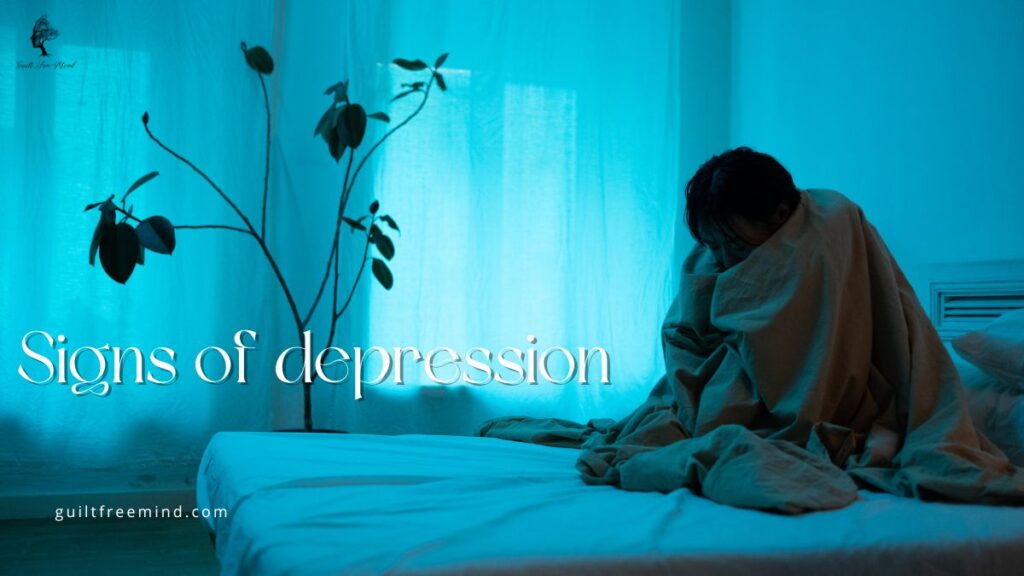
Signs of Depression in older people
- Depression is not a natural part of getting older, and it should never be taken lightly. Older adults are often misdiagnosed and ignored for depression, and they may be afraid to ask for help. The signs of depression in older people may be different or less clear, such as:
- Problems with memory or changes in personality
- Unexplainable aches or pains in the body
- Fatigue, loss of appetite, trouble sleeping, or loss of interest in sex not caused by a medical condition or medicine
- often prefer to stay at home instead of going out to meet people or try new things.
- Thoughts or feelings of suicide, particularly in older men.
Causes of depression
Biological causes of depression
Depression is a mental illness that affects a lot of people all over the world. Even though we don’t fully understand what causes such high levels of sadness, we do know that there are many biological factors that can lead to it. Here are some of the most important biological reasons for depression and how they may lead to the disorder:
Depression is strongly linked to genes. Research studies suggest that certain genes may make it more likely that someone will get depressed. For example, differences in the genes that control the levels of neurotransmitters like serotonin, dopamine, and norepinephrine can affect mood and may add to depression.
Neurotransmitters
Neurotransmitters are chemicals in the brain that control mood. If these chemicals are produced at improper levels, it can lead to symptoms of clinical depression. Low amounts of serotonin have been linked to depression in particular. Dopamine and norepinephrine are two other chemicals that help control mood. When the levels of these neurotransmitters fluctuate, it causes the symptoms of depression in the person.
Structure and function of the brain
The hippocampus, amygdala, and the prefrontal cortex are all parts of the brain that help control mood and feeling. Depression may be caused or made worse by changes in the shape or function of these areas. For example, a study has shown that people with depression tend to have a smaller hippocampus than people who don’t have depression.
Amygdala
The amygdala is part of a group of structures deep in the brain that are linked to feelings like anger, pleasure, sadness, fear, and sexual arousal. The amygdala is activated when a scary experience, is brought back to mind. When a person is sad or clinically depressed, there is more activity in the amygdala, and this stays true even after the sadness is gone. The amygdala may get bigger as a result of this rise in activity.
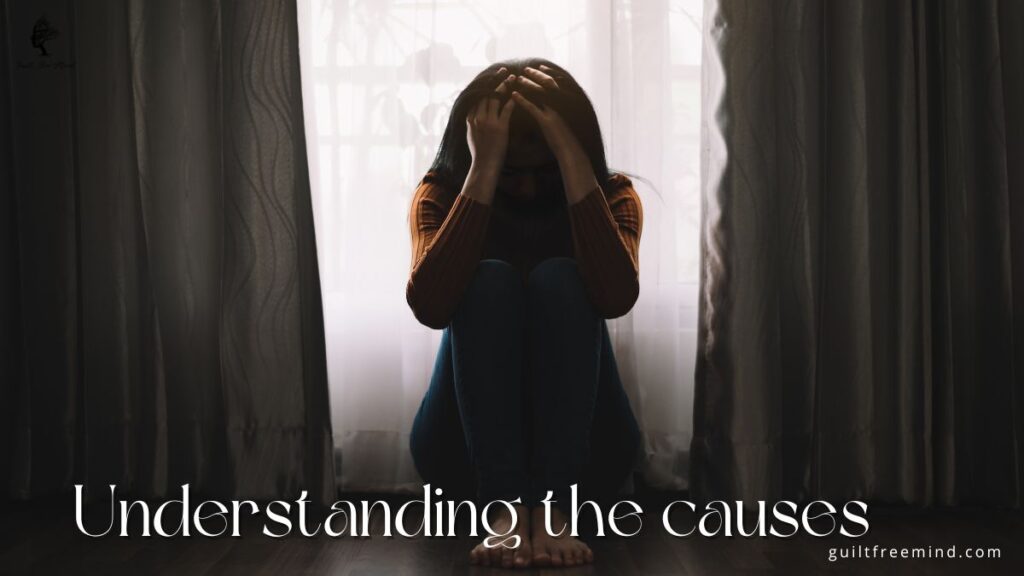
Basal ganglia
The basal ganglia are a group of structures deep in the brain that work together. They have a link with the structures close to the surface of the brain and talk to them. They may help you move and may also help you remember things, think, and deal with your feelings. One of the causes of depression is the atrophy (shrinkage) of the basal ganglia and other forms of changes in the same.
Hippocampus:
The hippocampus is a key part of how we remember things and how information is stored in long-term memory. The “once bitten, twice shy” type of attitude may come from the interaction between the hippocampus and the amygdala. Suppose you were attacked by a barking, aggressive dog. This is the section that will store the fear regarding the incident. This memory of this may make you wary of dogs in the future. Those who suffer from depression have been shown to have a smaller hippocampus, and research shows that this is because stress hormones make it hard for neurons in this part of the brain to grow.
Hormones
Some hormones, like cortisol, thyroid hormones, and estrogen, can change how you feel and may be a cause of sadness. One of the causes of depression is high amounts of the “stress hormone” cortisol.
Sleep issues
It’s difficult for us to fall asleep when we feel sad. Those with depression often have trouble sleeping. They are either unsuccessful at falling asleep or they tend to sleep too much. People with depression can have trouble with their circadian rhythms, which control sleep and other body processes.
Here are a few of the ways that sleep can make depression worse:
Disruption of circadian rhythms:
People with depression can have trouble with their circadian rhythms, which control sleep and other body processes. This can cause changes in the time and quality of sleep, which can make it harder to stay in a good mood.
Changes in neurotransmitters
Sleep is an important part of keeping the amounts of neurotransmitters like serotonin, dopamine, and norepinephrine in the brain in check. When you don’t get enough sleep, these chemicals can get out of balance, which can lead to depression.
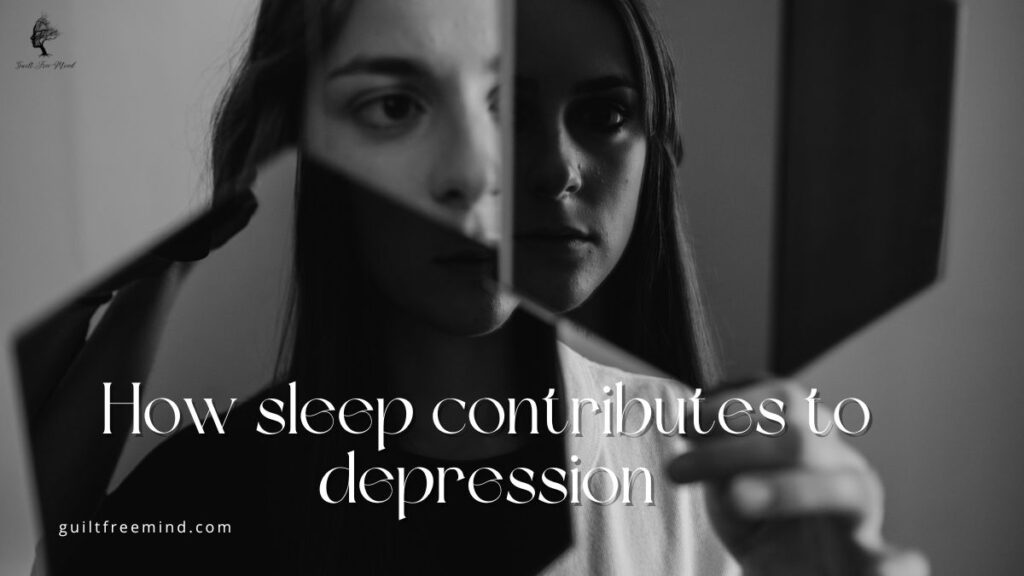
Poor sleep quality
People with depression often say they have a hard time falling asleep, wake up often at night, and wake up early in the morning. Bad sleep can make you tired, and irritable, and contribute to other signs of depression.
Negative thoughts and ruminating
Sleep problems can also cause negative thoughts and rumination, which are typical signs of depression. People with depression may spend more time awake in bed, which leads to overthinking and too much worry.
Effects on daily life
Not getting enough sleep can also make it hard to do things like go to work, school, or hang out with friends. This can make people feel hopeless, powerless, and hopeless, which are all signs of depression.
Genetic causes of depression
You may have heard others say that depression runs in families. In this section, I will discuss this exact saying and the role of genes in contributing to depression.
Family history
Depression can run in families, which shows that it’s partly caused by genes. Research has shown that someone who has a parent, sibling, or kid with depression is two to three times more likely to get depressed than someone who doesn’t have a family history of depression.
Twin studies
Twin studies have also shown that one of the causes of depression can be the genetic makeup of the person. Fraternal twins, who share only about 50% of their genes, are less likely to experience depression compared to identical twins. This is because identical twins share all of their genes.
Presence of candidate genes
Scientists have found a number of genes that link to depression. Some of these genes control neurotransmitters like serotonin, dopamine, and norepinephrine levels. Changes in these genes may change the mood and make the person depressed.

Epigenetics
Epigenetic changes refer to the changes in the expression of the genetic pattern of an individual. How the genes express can also be one of the causes of depression. For example, studies have shown that people with depression tend to show differences in the methylation of certain genes This can change how genes are expressed and exacerbate the disorder.
Environmental causes of depression
Trauma in childhood
Childhood traumas, like abuse, mistreatment, or being brought up in an environment full of violence, can make a person inclined towards developing depressive disorder later in life. This could be because of the way the brain changes as a result of long-term worry.
Sudden life events
Life events like the death of a loved one, getting divorced, or losing a job can throw a person into sudden depression. These things can cause a lot of stress and mess up your daily life, which can make you feel sad, hopeless, and helpless constantly. However, in most cases, such situations resolve by the time the person has passed through the grieving period. If the grief carries on for months, the affected person should visit a grief counselor so they can get proper guidance on how to navigate through their grief.
Chronic stress
Stress that lasts for a long time, like trouble with money or relationships, can also lead to depression. Changes in the brain caused by long-term worry can affect mood and make it more likely that a person will become depressed.

Isolation
Depression can also be caused by a lack of social support and separation from other people. Whether it is an infectious disease or a family fallout, both these situations can throw the person into extreme and persistent sadness. Support from friends and family can help you deal with stress and give you a sense of connection and purpose.
Use of drugs or alcohol
Using drugs or alcohol, like alcohol or drugs, can make you feel down. Drug use can change the levels of neurotransmitters in the brain and mess up how the brain normally works. This can cause mood changes and other signs of sadness.
Chronic illness
Illnesses that last for a long time, like diabetes or heart disease, can also lead to sadness. Constant physical and mental suffering can impact your mood negatively. Mood swings can cause further problems in the social and personal relationships of the person. These things can cause a lot of worry and may change how the brain works and how you feel.
A few final words on causes of depression
Biological, genetic, and environmental factors can contribute to depression. Understanding what makes someone depressed is an important step in figuring out how to diagnose and treat the problem.
Changes in the way the brain works and abnormalities in neurotransmitters are some of the causes of depression. Family background and studies of twins show that genetics may also play a role. Depression can also be caused by things like childhood trauma, life events, chronic stress, social isolation, drug use, and long-term sickness.
This is a disease with many different parts, and there is no one cause that can explain all cases. Depression is the result of a complex mix of biological, genetic, and environmental factors that interact with each other.
The treatment of depression involves a mix of medication, psychotherapy, and changes in lifestyle, such as getting better sleep, working out, and reaching out for social support. People with depression can take steps to control their symptoms and improve their quality of life by figuring out what makes them sad in the first place.
If you wish to know more about leading a healthy, happy, and fulfilling life, please subscribe to the Guilt Free Mind. The subscription option is present in the sidebar. If you like watching videos, subscribe to the YouTube channel of Guilt Free Mind. Remember to hit the notification bell and set it to all, so that YouTube notifies you every time I release a new video. If you have any queries about this blog post or any other on Guilt Free Mind, feel free to drop them in the comment section below. I will respond as soon as I can.
I will be happy to help
